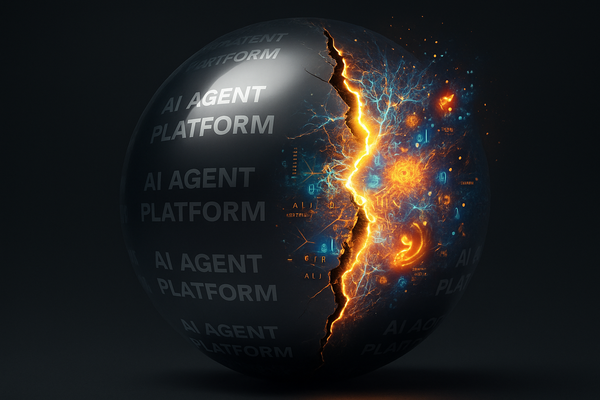The Great AI Rebrand: When Names Reveal Strategy

In the carefully orchestrated world of tech marketing, words are never just words. They're strategic weapons, carefully chosen to shape perception and stake claims in emerging markets. So when Microsoft began quietly shifting its terminology from "CoPilots" to "agents," it wasn't just updating its style guide—it was signaling a fundamental shift in how AI will integrate into our professional lives.
"The language we use to describe AI shapes not just how we perceive it, but how we interact with it."
The Evolution of Agency
The distinction between a copilot and an agent might seem subtle, but it reveals volumes about where AI technology is heading. A copilot, by definition, assists the main pilot. It suggests a subordinate role, a helper that supports but never leads. An agent, however, operates with autonomy. It acts on behalf of others, makes decisions, and takes independent action. This linguistic pivot isn't just semantic gymnastics—it's a declaration of intent.
Microsoft's announcement of 10 new AI agents arrives at a moment when the industry is grappling with how to position AI in the workplace hierarchy. McKinsey's findings of a 30% reduction in administrative tasks through their pilot program hints at why this repositioning matters. We're no longer talking about assistive technology; we're witnessing the emergence of digital workers capable of autonomous decision-making and execution.
"With 40% of Fortune 100 companies already embracing these technologies, we're past the point of speculation and deep into the reality of AI integration."
The Politics of Intelligence
The timing of this terminological shift becomes even more interesting when viewed against the backdrop of industry politics. Salesforce CEO Marc Benioff's public skepticism about AI hype—particularly his criticism of Microsoft—reveals the competitive tensions at play. When Benioff suggests the industry is overselling AI's potential, he's not just urging caution; he's attempting to control the narrative around what AI can and should be in the enterprise space.
But the numbers tell a different story. The 40% adoption rate among Fortune 100 companies suggests that while tech leaders debate terminology, businesses are voting with their workflows. They're finding tangible value in these tools, regardless of what we call them.
The Hidden Revolution
The most profound aspect of this transition isn't the technology itself—it's how it's quietly reshaping the nature of work. Forbes' projection of a 40% efficiency boost through AI integration only tells part of the story. The real transformation is happening in the spaces where human cognition is being freed from routine tasks.
Consider OpenAI's Canvas feature, which enables side-by-side text comparisons. On the surface, it's a simple productivity tool. But it represents a broader shift in how we process and analyze information, augmenting human decision-making rather than replacing it. This is where the true promise of AI "agents" lies—not in mimicking human workers, but in creating new categories of work entirely.
"We're not just automating tasks; we're reinventing the relationship between human cognition and digital capability."
The Economic Imperative
Robert Smith's observations at the CAIS Summit about generative AI's economic benefits in enterprise software cut through the theoretical debates. When portfolio companies report tangible improvements in efficiency and capability, it moves the conversation from speculation to practical reality. The adoption of AI isn't just about staying competitive—it's becoming fundamental to business viability.
But there's a deeper economic story here. The shift from copilots to agents reflects a growing recognition that AI's value isn't just in cost reduction or efficiency gains. It's in the creation of new capabilities that weren't possible before. When AI moves from assistant to agent, it doesn't just do existing jobs better—it creates new possibilities for value creation.
The Human Question
As these AI agents become more autonomous and capable, we're forced to confront more profound questions about the nature of work and agency. The concern isn't whether AI will replace human workers—that's an oversimplified binary. The real question is how this technology will reshape the landscape of human potential.
When routine cognitive tasks are automated, what becomes of the human capacity for creativity and strategic thinking? As AI agents take on more autonomous roles, how does this shift our understanding of productivity and value creation? These aren't just philosophical musings—they're practical considerations that will shape how organizations structure themselves in the coming decades.
"The future of work isn't a zero-sum game between human and artificial intelligence—it's about finding new forms of synergy we haven't yet imagined."
This rebranding from copilots to agents isn't just about marketing—it's a window into how the industry envisions the future of human-AI collaboration. It suggests a future where AI isn't just a tool we use, but an active participant in the creation of value. Whether we're ready for this future or not, it's already unfolding in the decisions and investments being made today.
The question isn't whether AI will become more autonomous—it's how we'll adapt our organizations, our skills, and our understanding of work to thrive in this new reality. In this light, the shift from copilot to agent isn't just a change in terminology—it's a preview of the profound transformations yet to come.
What remains to be seen is whether our human institutions and frameworks can evolve as quickly as the technology itself. As we stand at this crossroads, the real challenge isn't technical capability—it's our collective imagination about what's possible when human and artificial intelligence truly learn to dance together.




